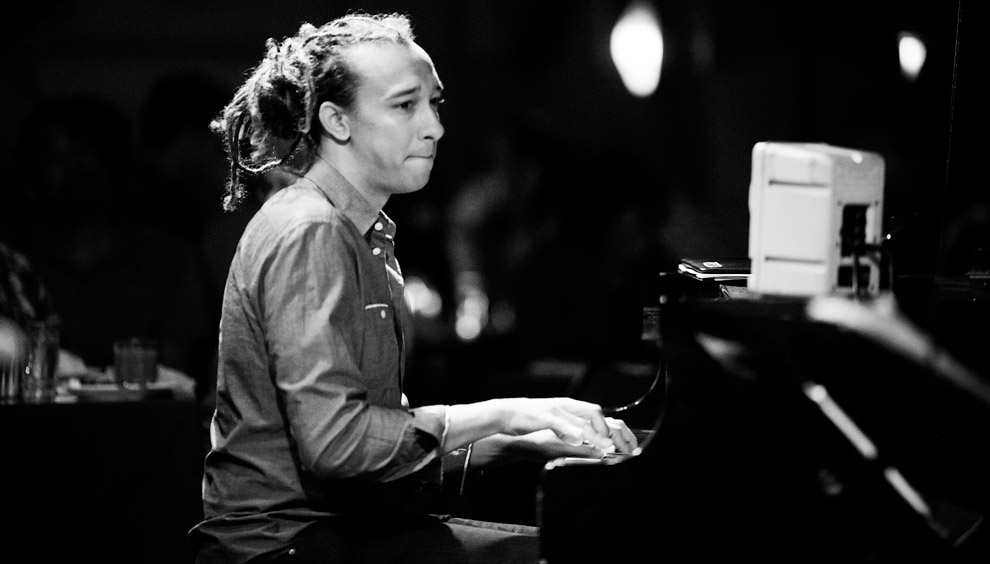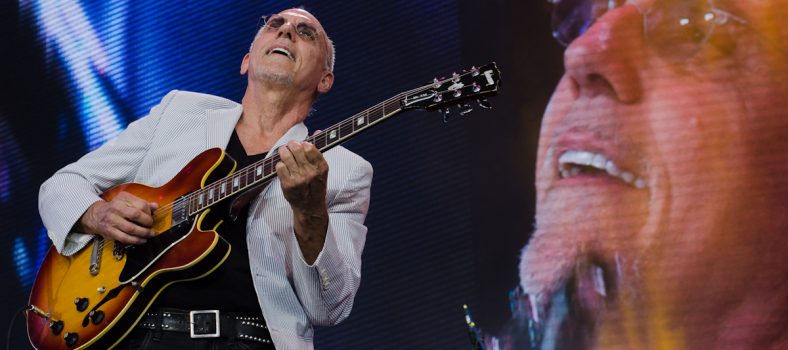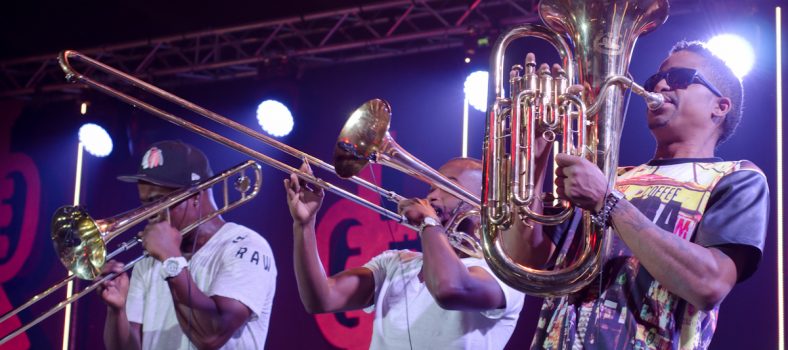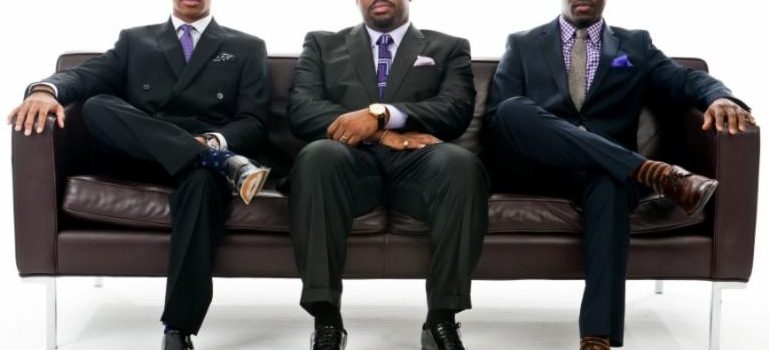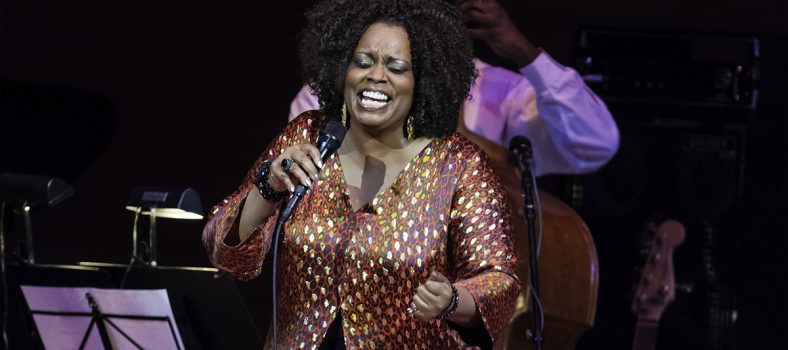iRJ: In your bio it mentions “you dodged early pressures to become a prodigy”. How so?
GC: I mean, I think the word prodigy is a silly word. I think I dodged early pressures to put myself out there as an artist. There were a few occasions where people were encouraging me to record. I started to gig with a trio in LA and many people suggested we have to record and capture this energy and document it. And my dad was really smart and said that you have the rest of your life to record and not to jump into recording too soon. He told me to be patient. I’m really thankful he gave me that advice because it gave me more time to focus on the music and less on the ego. The ego (laughing) is a tricky thing, you know, deciding that you want to put yourself out there and have a career with music. If you are not sort of balanced and level headed you might fall into some traps. And I think that you are more susceptible to that if you start at a young age.
iRJ: Sounds like that decision was instrumental to your success.
GC: Yeah, it’s daunting of how much there is to be learned. It wouldn’t make sense to be like, “yeah, now is my chance. Let me show the world what I have”. You would just get humbled. I hadn’t even been to New York yet. Once you come to New York you are exposed to a whole plethora of musicians who are pushing the music in various ways. It takes some of those experiences of humbling yourself to the music before it’s the right time to make a statement and try and put yourself in the mix.
iRJ: You have lived both places, so besides the obvious, what is the difference between the Los Angeles and New York when it comes to jazz music?
GC: I think it’s really the lifestyle and environment that affects every facet of that city. I mean when you go to gig in LA, you drive your car, you sit in traffic, you are listening to music in the car so there are still moments of productivity in that regard. That’s a certain vibe and mindset. And then you go to NY and you have to take the train everywhere and it’s really cold outside and you put on all of these layers and there’s some shady people so you have to watch your wallet. It’s sort of gives you a different energy when you show up for a gig and you might start a tune with a different tempo. Due to those variables, it might create a different feel than it might in LA. I really think it’s just the lifestyle and environment that is the real reason behind that. But Los Angeles is such a spread out city it’s harder for there to be a scene. For people to come out on a nightly basis to check out music there has to be a lot of proactivity on their part. Unfortunately, that doesn’t happen so much so you sort of like get into your own little scene with a couple of people that you play with and you don’t branch too far outside of that unless you really make it happen. And New York is just like a flowing river and you just jump in it. There are 6-10 places to choose from the go see music every night and they are walking distance from each other. So you go from one club to another one then to a jam session all night. It’s easy to be inspired in the city so it kind of makes sense for all musicians to travel here at some point and get a good dose of the New York scene. I don’t necessarily hold one above the other, they are just different. I think it just comes down to each individual’s proactive choice following their goals and dreams as far as music.
iRJ: Is there a solid bond or camaraderie in jazz music today?
GC: Yes, it is, but it’s different than what it used to be. I think in the past there was more of a unified, agreed upon way of playing the music, even 20 or 30 years ago, compared to now where this is a little more of a blank canvas and there is a lot more types. The word jazz is such a bogus word anyway, but it encompasses so much, there are so many different styles. There is camaraderie, though. A lot of cats have love for each other and respect, but it’s was a little different before when everybody was speaking exactly the same language musically. There was diversity as far back as the beginning of the music, but there was just a different feel to the community than there is now and in some ways that’s a little sad. You see different generations huff and puff about it in different ways, but I think the goal for people like me is to find people that are like minded, that you connect with on a musical and personal level and just stick to them, learn from them and make music with them. That’s not to say that we don’t branch out and play with other cliques. The bulk of our exploration is with the people that we really dig and say, “that’s my shit, right there. These are my peers.”
iRJ: How was your experience playing with Roy Hargrove? What did you learn?
GC: The main thing was his dedication to the music. He’s about the music 24 hours a day, 7 days a week. It’s really a nonstop thing for him and he’s one of the most talented people out there. His ears are really special. He soaks up everything. Any song that he’s basically ever played in his life he knows and he can access in his memory. So, we’d be on the road and we would get to the hotel and there would be a piano in the lobby and Roy would go and start playing a tune by John Hicks or something. If you didn’t take it upon yourself–he didn’t tell you to do this–but if you didn’t look over his shoulder and bring your iPod and record it or really check it out and learn it then you might be caught slipping the next night when he calls that tune on the stand. Just to have that experience, I learned so much. I got to see that he that he was really about the music and nothing else. I think that’s the main thing I took out of it. It was also the first time I really traveled and toured on the road for that length (3 years) of time, so that was an experience in itself.
iRJ: How is the road? How was your experience touring as a young artist?
GC: It can be difficult and tiring. You’re away from your loves ones and friends and family, so it’s definitely a psychological challenge. The first time you’re in these different countries there can be culture clash, people can treat you funny or look at your weird and you don’t what food to order. Once you go through these experiences once, the second time around it’s easier and the third time it’s easier and then after a certain point you take a different angle about it and look at it as a chance to represent your country and your friends and the people you relate to. I take it a little more seriously now than I used to. It’s almost like being a diplomat. It’s a really luxurious problem to have. We are really lucky to travel and to see these places that so many people don’t so that when we go there it behooves us not be in a grumpy mood or be mad just because we didn’t get to eat our hot dogs and cheeseburgers that we are used to. Instead we just try to come with a humble heart, and be honest and cool and try to show people how we think, who we ought to be, and how we should be represented in the world. Now, I love it. I think it’s great.
iRJ: Bringing this music and culture to the world and representing the states seems like a big responsibility.
GC: It’s a job. It’s certainly exciting, but also we know that we have to stand at the airport for two hours, be on a plane for a long time, and get to the hotel and my room probably won’t be ready and I’ll probably have to sleep on the lobby couch for an hour before they get my room ready. There are the other details from the road that isn’t often heard that’s not always fun and games, but again it’s a blessing to do it so I definitely don’t complain about it.
iRJ: You see to have found a great bond with your trio mates, Joe Saunders and Justin Brown. How did you guys connect and how long have you been playing together?
GC: We met in the Grammy Band back in high school in LA. The Grammy’s put together a high school band every year from applicants they select from all over the country. It was basically an all-star band and I just remember Justin and Joe being “monsters” even back then. It was great. I was really inspired. It was the first time I had heard people my age play at that level. And from then on we just kept on crossing path and then we ended up in NY at the same time and we’ve been touring as a trio for 3-4 years now. It’s such a big community and that bond extends past the three of us to a lot of other guys around the same time that are still on the scene.
iRJ: Who would your top 5 pianist be? Alive or dead.
GC: Oh man, alive and dead that’s hard. Art Tatum, for sure. You’re not going to play the piano better than Art Tatum. Alive, I would say Herbie Hancock because he just keeps on evolving and his harmonic concepts and rhythmic and melodic—his harmony is mind blowing. Gonzales Rubicaba (Cuba) is another one. I’m constantly blow away by his control of the instrument, his touch is unmatched…it’s pretty scary to see him play. After a certain point I get different things from different people I listen to. Keith Jarrett is obviously another master of improvisation. His left hand is amazing. Certain pianists have this independence of their hands where you feel like their hands are having a conversation with themselves almost like they have two brains. Keith can be like that, Brad Meldau is like that, so I am totally inspired by them. And then guys my age too like Fabian Almazan, Robert Glasper, Taylor Eigsti, and Aaron Parks. These guys are really inspiring for me too and to see how they are developing the things that they are checking out and how their music is evolving. It’s a beautiful thing.
iRJ: The fact that there are so many excellent artists confirms that there is room for others to take the place among the greats.
GC: Yeah, it’s funny. Music is its own reward. It’s a universal gift for everybody to pick from. It’s this fruitful tree that each individual has different degrees of aspiration. Some guys only want to check out this much. Some people only treat music as a hobby and they just want to play a few chords. That’s fine for them and other people aspire to write symphonies. It’s totally open. If you approach it from the standpoint of doing it for the music, the rest kind of takes care of itself. If the truths and wisdom that you discover in music are deep enough then, yeah, you have no choice but to get that recognition. There is a reason Herbie Hancock is Herbie Hancock. He’s really expanded his ears and his understanding of music throughout his entire career.
iRJ: What about you? What do you play for? What is the future of your music?
GC: I don’t know if I really know. I know that I want to continue to grow and for my ears to expand and to hear more and more. I think it’s kind of a never ending journey, so that’s exciting. But I’ve been thinking a lot lately about that fact that if you take a step back, holding yourself to like different standards, and protocol, like you have to act this way or play these tunes a certain way if you want to be in this scene, which is sort of silly and meaningless. It’s really is up to the individual. I’m trying to give my honesty and find what I feel like is my calling musically. I definitely have aspirations of doing big things, writing for bigger groups, larger ensembles and different types of instrumentation. I enjoy the process of trying to expand my understanding of music and soak in new music. I’ll just continue to that and see where it takes me. I’m sort of over trying to be “killing” and trying to impress people. That starts to get old. It’s kind of refreshing to have kind of gone though that cycle a little bit and try to approach composition and playing from a new perspective of just enjoying myself and find that honesty in the music. Music is just another expression of human life and the human struggle is a universal thing and however we approach that through words, through music, through visual arts, whatever it may be, I think there are definitely a lot of similarities.
Listen to Gerald Clayton’s Grammy nominated music via his website: www.geraldclayton.com
By Johnathan Eaglin


